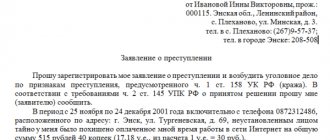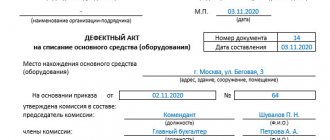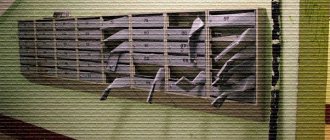If a person has committed unintentional damage to someone else's property, he can be prosecuted only in a few cases. It is this circumstance that distinguishes such a situation from similar actions, but committed with intent, for which more severe penalties are imposed.
Damage to property through negligence is a fairly common phenomenon, for which Article 168 of the Criminal Code provides for criminal liability.
Download for viewing and printing:
Article 168 of the Criminal Code of the Russian Federation “Destruction or damage to property through negligence”
Unintentional damage to property
Unintentional damage to someone else's property means causing harm to someone else's property that has material value and expression, without direct intent for such an outcome.
When is liability provided?
Punishments against the offender are applied when the unlawful act committed meets two conditions:
- The amount of damage caused as a result of careless actions by the guilty person exceeds the mark established in the Criminal Code for large damage of 250,000 rubles;
- Damage to property was caused by careless handling of fire or other sources of increased danger.
Criminal liability
Criminal actions that caused unintentional damage to property entail holding the guilty person accountable under the Criminal Code.
However, the application of punishment against the offender is possible only in cases where the damage caused by his actions is considered major. The offender faces one of the following penalties:
- Fine of up to 120,000 rubles;
- Performing mandatory work for up to 480 hours;
- Carrying out correctional work, the maximum duration of which should not exceed 2 years;
- Restriction of freedom. The maximum sentence is 1 year;
- Carrying out forced labor for up to 1 year;
- Imprisonment for up to 1 year.
When property damage does not fall under the Criminal Code
Bringing the guilty person to justice is possible only in cases where major damage has occurred as a result of unintentional damage or complete destruction of property. Accordingly, if the value of the lost property is below this level, bringing the guilty person to criminal liability is not allowed.
Some interesting and important points
The question arises - what will happen if property worth less than 2,500 rubles is destroyed? Or, although more than 2,500 rubles, there is no significant damage? The answer is simple: it will no longer be a crime, but just an offense. This is Article 7.17 of the Code of Administrative Offenses of the Russian Federation, and not Article 167 of the Criminal Code of the Russian Federation “Deliberate destruction or damage to property.”
It is important to know: our lawyer will make every effort to ensure that the case is classified as such - under Article 7.17 of the Code of Administrative Offenses of the Russian Federation. The punishment there is a fine of 300 to 500 rubles.
Case from practice: Citizen A. damaged the property of family B.: the front door worth 500 rubles and window glass worth 1050. In total, he caused damage worth 1550 rubles. And the investigator decided that this was part 1 of Article 167 of the Criminal Code of the Russian Federation “Deliberate destruction or damage to property”, the accused was convicted. Although it is immediately clear that there is no criminal case here, because for there to be one, the damage must be no less than 2,500 rubles. The case reached the Supreme Court and only it overturned the illegal verdict.
It is important to know: this is an example of the work of an investigator and a prosecutor. After all, not a single case goes to court without the permission of the prosecutor. Both the investigator and the prosecutor committed lawlessness. The job of a criminal lawyer at our company is to ensure that this does not happen to you.
Another example: K. was convicted of several articles, including part 1 of article 167 of the Criminal Code. He tried to take possession of someone else's car, and to do this he broke the glass in it. Damage - 2,700 rubles, this happened a long time ago. Of course, the investigator immediately “seized” on the figure: since it’s more than 2,500 rubles, it means significant damage. But it was not there. The Judicial Collegium for Criminal Cases of the Supreme Court ruled that the “significance” of the damage had not been proven: “the verdict does not provide information to substantiate the conclusion that damage in the amount of 2,700 rubles was caused to the owner of the car. is significant for him." The court commuted the punishment by removing part 1 of Article 167 of the Criminal Code from the sentence.
Of course, if the damage caused is more than 2,500 rubles, then the investigator “automatically” considers that this is significant damage. In this case, the investigation ignores the property status of the victim. Even if the victim himself declares that the damage to him is insignificant, the investigator still initiates a case under Part 1 of Article 167 of the Criminal Code of the Russian Federation. We need to do some statistics.
The corpus delicti under Article 168
This article of the code contains a list of penalties that apply to a criminal who has destroyed or damaged someone else’s property through negligence.
To qualify such an offense as an act punishable under this article, it is necessary that the crime has the proper ingredients.
The object of a criminal act is a relationship that falls into the category of property. The subject of the crime is property owned by another person, regardless of its type: movable or immovable.
The objective side of such a criminal act implies damage or complete destruction of movable or immovable property. Qualification of actions as such an offense is possible when the damage was caused by careless handling of a source of increased danger.
The subject of a crime can be any sane person who has reached the age of 16 at the time of the commission of the offense. Particular attention is paid to illegal actions committed by an official. Depending on the circumstances of the case, the crime may be classified under Article 286 of the code, which provides for more severe penalties.
Important! An unlawful act can only be committed through negligence: in the form of criminal frivolity or negligence. Download for viewing and printing:
Article 286 of the Criminal Code of the Russian Federation “Excess of official powers”
Commentary on Article 167 of the Criminal Code of the Russian Federation
1. The social danger of a criminal attack is that it often causes irreparable material harm, and can also cause damage to cultural or other values.
2. Like all crimes against property, it encroaches on someone else's property (the main object). An optional subject may be the life and health of people, relationships related to the culture of the country.
3. The subject of the encroachment is both movable and immovable property (see commentary to Article 158), except for special types of property, the punishment for destruction and damage of which is provided for in other articles of the Criminal Code of the Russian Federation (see Articles 243, 244, 267, 325, 346). In addition, destruction and damage to someone else's property can act as a consequence of crimes such as terrorism (Article 205), hijacking of an air or water transport vessel or railway rolling stock (Article 211), mass riots (Article 212), hooliganism ( Art. 213 of the Criminal Code of Russia), vandalism (Art. 214), cruelty to animals (Art. 245), sabotage (Art. 281), as well as crimes in the field of computer information (Art. 272, 273).
4. From the objective side, the compositions are described as material, which presupposes the presence of: a) an act; b) material socially dangerous consequences; c) the causal connection between the act and the given consequence.
5. The act is expressed in action or inaction (for example, failure to take measures to extinguish a fire).
6. The result of the action or inaction must be the destruction or damage of someone else's property, resulting in significant damage.
7. Destruction is the bringing of material assets to a state where they completely lose their economic value and cannot be used for their intended purpose.
8. When property is damaged, harm is caused that significantly reduces its economic value and entails a partial loss of its consumer properties. However, damaged items can be restored and used again for their intended purpose. This naturally reduces the value and quality of the property.
9. The damage is assessed as significant based on specific circumstances. In this case, not only the value of the property is taken into account, but also the financial situation of the victim, the value of the destroyed or damaged property for the victim, the possibility of its restoration, as well as the provisions of paragraph 2 of the note. to Art. 158, according to which significant damage to a citizen cannot be less than 2,500 rubles. If the damage is not significant, the act is not criminal.
10. This crime can be committed with both direct and indirect intent. Motives do not have a qualifying value, but they allow one to distinguish the analyzed act from related crimes (sabotage, terrorism, hooliganism, vandalism, etc.).
11. Part 1 comment. of the article, the subjects of a criminal attack are persons who have reached the age of 16, according to Part 2 - 14 years of age.
12. Aggravate liability in accordance with Part 2 of the comment. articles of destruction or damage to someone else's property for hooligan reasons (see paragraph 17 of the commentary to Article 105), by arson, explosion or other generally dangerous method (for example, flooding, organizing a transport accident, etc.).
12.1. Use of arson, explosion, etc. assumes that these methods of destruction or damage to property create a threat of harm to person or property that the perpetrator did not intend to destroy or damage. Therefore, the deliberate destruction or damage of individual objects using fire in conditions that exclude its spread to other objects, and the emergence of a threat of harm to the life and health of people, other people’s property, - indicates the Plenum of the Armed Forces of the Russian Federation in paragraph 6 of Resolution No. 14 dated 06/05/2002, - must be qualified according to part 1 comment. article if the victim suffered significant damage.
13. Another qualifying feature is causing death to a person or other grave consequences. The latter include: causing serious harm to the health of at least one person or moderate harm to the health of two or more persons; leaving victims without housing or means of subsistence; long-term suspension or disruption of the work of an enterprise, institution or organization; long-term disconnection of consumers from life support sources - electricity, gas, heat, water supply, etc. (Clause 10 of the Resolution of the Plenum of the Armed Forces of the Russian Federation dated 06/05/2002 N 14).
14. Negligently causing death to a person or other grave consequences is characterized by two forms of guilt: intentional guilt in relation to the main consequences and negligence in relation to additional consequences.
15. Destruction or damage to one’s own property does not constitute a crime. However, if as a result of such arson significant damage was caused to someone else’s property or to property that was the joint property of other persons and the perpetrator, then the actions of the latter, who wanted the specified consequences to occur or did not want them, but consciously allowed them or treated them indifferently, should be qualified as intentional destruction or damaging another's property by arson. If, as a result of such arson, large-scale damage was caused to the specified property due to negligence, then the actions of the perpetrator should be qualified under Art. 168 (see paragraph 8 of the Resolution of the Plenum of the Armed Forces of the Russian Federation dated 06/05/2002 N 14).
16. The main composition reflects acts included in the category of crimes of minor gravity, the qualified composition - in the category of crimes of medium gravity.
Determining the value of an item
To determine whether the perpetrator of the offense is subject to prosecution under the Criminal Code, you need to find out the exact amount of damage caused. As a rule, to establish this circumstance, the owner turns to an independent expert to conduct research at the preliminary investigation stage.
Most often, the expert conducts research on the following real estate objects:
- Motor transport;
- Real estate;
- Goods that are considered expensive. The cost of these property items is determined on the basis of sales receipts (if these documents are available).
If, based on the results of the examination, it is established that the amount of damage caused by negligence is large, the victim may apply to initiate a criminal case.
Criminal penalties can be avoided legally
Part 1 of Article 167 of the Criminal Code of the Russian Federation “Deliberate destruction or damage to property” is a crime of minor gravity, and part 2 is of medium gravity. The Criminal Code provides 3 opportunities to avoid criminal liability.
1. Exemption from liability due to active repentance (Article 75 of the Criminal Code of the Russian Federation). In order for the court to apply this article and release the accused from punishment, it is necessary:
- that the crime was committed for the first time;
- so that it is of small or medium severity (this is our case);
- confess;
- help the investigator solve the crime, that is, give truthful and complete testimony;
- make amends for the harm caused (that is, compensate the losses to the victim).
2. Exemption from liability in connection with reconciliation with the victim (Article 76 of the Criminal Code of the Russian Federation). Just as in the first case, it is required that:
- the crime was committed for the first time;
- crime of minor or moderate gravity;
- the damage caused was made up, that is, the victim was compensated for losses;
- the victim agreed to make peace.
3. Exemption from liability due to the expiration of the statute of limitations (Article 78 of the Criminal Code of the Russian Federation). No one can be held accountable or convicted if 2 years or more have passed since the commission of a minor crime. The same applies to a crime of medium gravity, but in this case 6 years or more must pass.
It’s important to know: everything seems simple. But in reality, there are “pitfalls” that can appear during interrogation by an investigator or directly in court, which is even worse. And now you were hoping for a successful outcome, but instead you face a real sentence. Surprises in a criminal case are bad surprises, and it is better not to have them. An experienced criminal lawyer will ensure that there are no surprises.
When is an arson investigation scheduled?
To understand whether the arson was intentional or unintentional, an examination is carried out. Often the initiator of its implementation is an interested person.
For example, an insurance company conducts an examination to find out whether the car was set on fire intentionally or not.
After all, sometimes car owners themselves set fire to their cars in order to receive compensation payments from the insurance company.
Thanks to this examination, it is possible to find out:
- whether there were deaths as a result of arson;
- what amount of damage was caused to the property owner;
- at what time the fire occurred;
- what materials and methods were used to commit the arson;
- the fire was caused intentionally or unintentionally.
Concept of destruction and damage to property
The concept of “Property damage” requires more detailed study. This term is evaluative, so specifying the damage itself is just as important as applying sanctions to persons who may be suspected of committing this crime.
The question arises as to whether the actions committed by a specific person fit this article. An intentional act, which is similar in description to Article 167 of the Criminal Code of the Russian Federation, but differs in meaning, can serve to incorrectly sentence the defendant himself.
Destruction of property is the complete loss by its owner of the useful characteristics of a certain item. Accordingly, based on this definition, damage is understood as a partial loss of the very benefits that their owner would have received if the things had not been damaged. As for quantitative measurements, the reduction of certain benefits represents a possible consequence of this crime.








